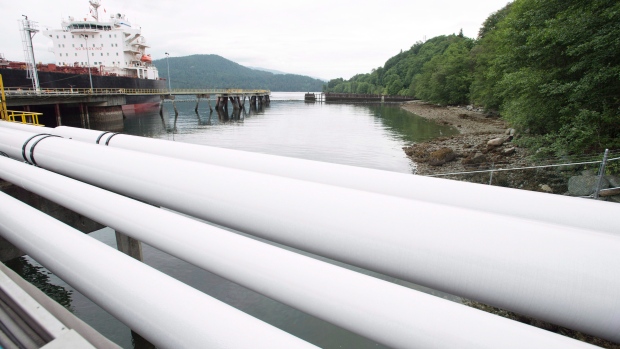Feb 17, 2017
Kinder Morgan begins talks with investors for $6.8B Trans Mountain expansion
, Reuters

Kinder Morgan Inc (KMI.N) has begun talks with institutional investors including major Canadian pension funds and private equity firms to raise capital for the $6.8 billion expansion of its Trans Mountain pipeline project, according to people familiar with the process.
Kinder Morgan has held discussions with Canada Pension Plan Investment Board, the Caisse de depot et placement du Quebec and Ontario Teachers' Pension Plan Board, three of the biggest Canadian pension funds, the people added. It was unclear whether these talks were continuing.
The biggest U.S. pipeline company, which has said its goals for 2017 include a joint venture or initial public offering of Trans Mountain, is stepping up financing efforts even though the massive project faces opposition from environmental and aboriginal groups. It won Canadian government approval late last year, and expects to start the expansion later in 2017 and complete it by 2019.
Kinder Morgan has hired Toronto Dominion Bank (TD.TO) as an adviser to help arrange financing, and the bank is expected to run a so-called "dual-track" process. Apart from a potential IPO, Kinder Morgan is also considering sale of a 50 per cent stake in Trans Mountain by creating a joint venture. The formal process to attract venture partners is getting underway, the people said.
"We're confident in the interest from the investment community and we're continuing to move forward with all aspects of planning in order to begin construction in September 2017," said Ali Hounsell, spokeswoman for Kinder Morgan's Trans Mountain Expansion Project.
The company will also tap sovereign wealth funds from the Middle East, the people said. Institutional investors are attracted to infrastructure assets because they tend to operate with long-term contracts and have stable cash flow.
CPPIB declined to comment. TD, the Caisse and Ontario Teachers did not immediately respond to requests for comment. Sources declined to be identified as the discussions are private.
MAJOR CANADIAN IPO
Should Kinder Morgan pursue a share sale instead, it would be among the biggest IPOs in Canadian history. An IPO could raise about 20 to 40 percent of the targeted budget, one of the people said, or between $1.4 billion and $2.7 billion.
The IPO could be a spin-off of its Trans Mountain pipeline business or the rest of its Canadian assets, which sources said would be more likely.
Trans Mountain has been operating since 1953. Most of the crude, which is produced in Alberta, is shipped to British Columbia’s Pacific Coast, with some volumes diverted south of the border to Washington State.
Kinder Morgan has owned the pipeline since 2005 when it bought Terasen Inc. The expansion project will make Trans Mountain one of the biggest pipelines in North America. For the company, it would almost triple the pipeline's capacity, allowing it to transport 890,000 barrels of oil per day.
The Trans Mountain expansion would increase access to fast-growing Asian refining markets and has strong support from Canadian oil sands shippers keen to diversify their customer base away from just the United States. But it faces strong opposition from environmentalists and communities along its route, with critics from First Nations chiefs to the mayor of Burnaby, where it terminates, vowing civil disobedience to disrupt construction. (http://reut.rs/2kDsWwh) Kinder Morgan Canada President Ian Anderson said last year he would be “naive” not to expect blockades during the build.
The current Trans Mountain pipeline is routinely oversubscribed, with shippers keen to transport crude to Canada’s Pacific coast usually only able to move a fraction of their nominated volumes.
The scarcity of such high-quality infrastructure assets makes them particularly attractive, often increasing competition among institutional players. Canada's growing pension funds have been forced to look beyond Canada for large acquisitions.
Frustration has been growing in the energy industry about Canadian pipelines struggling to get approved. The Trans Mountain expansion project was one of few to get a go-ahead in recent years, along with Enbridge Inc's (ENB.TO) Line 3 replacement project.




